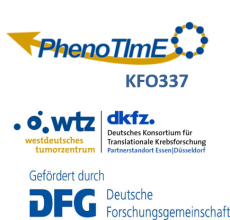PhenoTImE: PhD Project #1
Description Project #1 Epigenetic-metabolic reprogramming as a universal strategy in therapyresistant tumor cell phenotypes
Alterations in the epigenome and metabolism both affect molecular rewiring in cancer and facilitate adaptive cell state transitions during therapy and immune resistance. However, the molecular processes that control the dynamic switch towards or even between resistant cell phenotypes are poorly understood. The overall hypothesis of project P1 is that resistant tumor cell phenotypes, probably irrespective of their genetic background, share a common epigenetic-metabolic (‘epi-metabolic’) basis. Thus, the translational goal is to unravel the axis between epigenetics and metabolism and to identify superior therapeutic targets and biomarkers for rapid transfer into the clinics. Our preliminary work indicates that the histone H3K4 demethylase JARID1B/KDM5B is involved in both multi-drug resistance in melanoma patients and the regulation of crucial metabolic pathways including, but not limited to oxidative phosphorylation and the glutamine metabolism/glutathione-redox-system. Specifically, we hypothesize that the selection for JARID1Bhigh cells represents the initial event and prerequisite in longitudinal development of drug and immune resistance of patients. The exact contribution of the JARID1B-dependent epi-metabolic circuitry in priming surviving cells for further adaptive cell state transitions is not yet understood. The particular setting of collaborations and research goals proposed in the Clinical Research Unit PhenoTImE is an ideal platform to unravel both the molecular details of this bi-directional epi-metabolic circuitry and ways to exploit it as a superior target for overcoming tumor resistance also beyond melanoma. A deeper understanding of the link between epigenetics and metabolism could lead to novel drugs with significant improvement in cancer treatment, especially when sequentially combined with potent tumor-debulking drugs. This has immediate implications for the design of personalized clinical trials and could also lead to the development of new biomarkers and companion diagnostics in the near future.
Project-related publications of the Roesch lab (selection):
Roesch A, Paschen A, Landsberg J, Helfrich I, Becker JC, Schadendorf D. Phenotypic tumour cell plasticity as a resistance mechanism and therapeutic target in melanoma. Eur J Cancer. 2016 May;59:109-12.
Roesch A, Vultur A, Wang H, Speicher D, Bogeski I, Hoth M, Laschke MW, Koerbel C, Gimotty P, Philipp SE, Villanueva J, Fukunaga-Kalabis M, Vogt T, and Herlyn M. Overcoming intrinsic multidrug resistance in melanoma by blocking the mitochondrial respiratory chain of slow-cycling JARID1Bhigh cells. Cancer Cell. 2013 Jun;23:811-825.
Roesch A, Fukunaga-Kalabis M, Schmidt EC, Zabierowski SE, Brafford PA, Gimotty P, Vogt T, Herlyn M. The dynamic expression of JARID1B in a subpopulation of melanoma is required for continuous tumor growth. Cell. 2010 May;141:583–594.
Candidate Qualifications and Assignments
Candidate`s profile
- Master’s degree in any of the following or equivalent disciplines: Medical Sciences, Biology, Molecular Biology, Immunology, Cell Biology
- Practical expertise in cellular and molecular biology standard methods (e.g. QPCR, WB, cell staining, flow cytometry)
- Expertise in cultivation of human cells
- Expertise in bioinformatic analyses, R, or other commonly used software analyses tools would be an advantage
- Experience in animal work would be an advantage • Excellent communication and written skills in English
- Experience in drafting oral presentations
- Excellent organizational skills and attention to detail
- Highly motivated, creative, and committed and able to work independently and in a team
Project tasks & Training:
- Cell culture and functional assays for phenotypic cell characterization in 2D and 3D (proliferation, growth, invasion, cytotoxicity)
- Characterization of the effect of different targeted, immune, and novel epigenetic drugs on the tumor heterogeneity of melanoma
- Metabolic profiling of cells
- Multiplexed staining of human melanoma cells and tissue samples
- Implementation of various molecular biological tools such as doxycycline-inducible vectors systems, reporter constructs, etc.
- Sample generation for genome-wide RNA-seq and ChIP-seq analyses
- Validation of novel drug sequencing approaches in vivo (mice)
- Experiment planning, implementation, and subsequent evaluation
- Presenting the work at national and international conferences and scientific writing of papers
- Active collaboration with other researchers within the Clinical Research Unit



